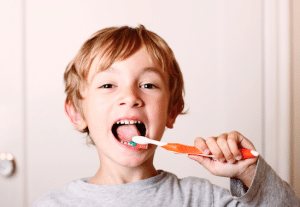 Pediatric Dentistry and Orthodontics of Virginia wants your child’s teeth to last all of his life, so it is important to teach him or her good dental habits. As your child grows, caring for his teeth will become a natural part of his daily routine. Good oral hygiene habits can limit or prevent problems such as cavities, gum disease and other dental issues. At PDOVA, we know that educating your child now will help them keep those habits for a lifetime! The best way to help your child form these habits is to start early, even before he is able to care for his own teeth. Gradually you can help him learn to care for his teeth all by himself.
Pediatric Dentistry and Orthodontics of Virginia wants your child’s teeth to last all of his life, so it is important to teach him or her good dental habits. As your child grows, caring for his teeth will become a natural part of his daily routine. Good oral hygiene habits can limit or prevent problems such as cavities, gum disease and other dental issues. At PDOVA, we know that educating your child now will help them keep those habits for a lifetime! The best way to help your child form these habits is to start early, even before he is able to care for his own teeth. Gradually you can help him learn to care for his teeth all by himself.
Brush and floss
According to the American Dental Association, it’s easy to care for your child’s teeth. Start when you notice the first tooth has erupted. For children ages 3 or younger, use a soft bristled toothbrush designed for children with a little dab of toothpaste, no larger than a grain of rice. For children ages 3 or older, use a small amount of fluoride toothpaste, about the size of a pea. Start using a toothpaste containing fluoride once the child is able to expectorate. Continue to brush your child’s teeth twice daily using small, circular motions until he is ready to do it on his own. There are many fun products on the market, so let your child help choose his toothpaste or toothbrush. Usually, by age 6 or 7, children are able to brush properly on their own, although they probably still need reminders and supervision.
When your child gets more teeth, especially when the teeth begin to fit closely together, it’s time to start flossing. Move the floss gently back and forth to remove trapped debris. Be careful not to yank the floss hard against the gums and ask your child to let you know if the flossing is uncomfortable.
Regular dental visits
To ensure that the teeth are growing properly, the American Academy of Pediatric Dentistry recommends that you take your child to the dentist after the first tooth appears, but no later than her first birthday. Thereafter, a child should visit the dentist twice a year for routine checkups and cleaning. These visits also give you the opportunity to ask any questions you may have about your child’s dental care. Remember that baby teeth are not only the first set of teeth, but are also saving places for the adult teeth to come later. Some adults are nervous about visits to the dentist, however it is important to lead by example. If you are calm, your demeanor has a positive effect on your child’s behavior during the visit.
Habits to avoid
Eating foods loaded with sugar, candy (particularly sticky or gummy candy,) or juices, can cause cavities. This is also true of sweetened liquid medicines. Have your child brush his teeth or rinse his mouth after consuming these items.
Teach your child to avoid chewing on ice. It is an easy habit to fall into, but it can destroy tooth enamel, leaving your teeth susceptible to decay. Ice chewing can also crack or chip teeth.
Eat a healthy diet
While a healthy diet should include from all the major food groups, offer a well-balanced diet that limits starchy and sugary foods, as these can lead to tooth decay. Make sure your child’s diet includes calcium for strong teeth. Encourage him to drink water instead of soda or juice. Keep your pantry stocked with fresh fruits and vegetables to encourage “healthy snacks.” Some of these, such as bananas and raisins, contain concentrated sugar, so your child should brush after eating them. In general, the frequency of snacking is more important than the amount eaten, because unless your child brushes after each snack, the food leads to tooth decay.
Pediatric Dentistry and Orthodontics of Virginia recommends that you model good dental hygiene to your child on a daily basis. Brush together twice a day. Don’t treat it as a chore, but rather have fun with it. The habits you create today will last a lifetime. If you would like to have a lesson on dental hygiene, let your provider know during your next visit. We will be happy to show your child the proper ways to brush and floss. To schedule your next appointment, contact PDOVA at (804) 739-0963 or use our easy, online scheduling tool.
